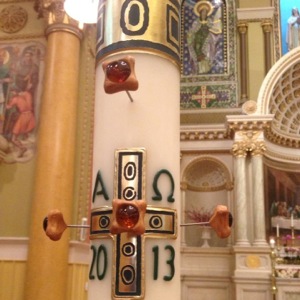
 EW THINGS ARE MORE IMPORTANT than the liturgy’s role in evangelization. So for many of us, preparations and choir rehearsals for Holy Week have already begun. Lent, Holy Week, and the Easter Season present an opportunity to evangelize to two very important groups. One is the influx of Catholics who do not attend mass regularly, but perhaps attend on Ash Wednesday, Palm Sunday, or Easter Sunday. We have only one or two shots to make a prayerful impression. Rather than being dismissive, it is our duty to be welcoming and show the best the Church has to offer.
EW THINGS ARE MORE IMPORTANT than the liturgy’s role in evangelization. So for many of us, preparations and choir rehearsals for Holy Week have already begun. Lent, Holy Week, and the Easter Season present an opportunity to evangelize to two very important groups. One is the influx of Catholics who do not attend mass regularly, but perhaps attend on Ash Wednesday, Palm Sunday, or Easter Sunday. We have only one or two shots to make a prayerful impression. Rather than being dismissive, it is our duty to be welcoming and show the best the Church has to offer.
The second group has a great deal in common with our own spiritual growth as music ministers: those preparing for baptism, confirmation and reception into the Church through the Rite of Christian Initiation of Adults (RCIA). This commonality may seem surprising, but their process of growth mirrors ours, and hopefully that of the entire Church’s.
RECENTLY, DR. GALIPEAU, Chief Publishing Officer for the J. S. Paluch Company, discussed the Church’s vision for catechumens in his article Frustration and Hope: The Evolution of the RCIA or not-RCIA. Dr. Galipeau cites Ad Gentes, the Second Vatican Council’s “Decree on the Mission Activity of the Church”:
14. Those who, through the Church, have accepted from God a belief in Christ are admitted to the catechumenate by liturgical rites. The catechumenate is not a mere expounding of doctrines and precepts, but a training period in the whole Christian life, and an apprenticeship duty drawn out, during which disciples are joined to Christ their Teacher. Therefore, catechumens should be properly instructed in the mystery of salvation and in the practice of Gospel morality, and by sacred rites which are to be held at successive intervals, they should be introduced into the life of faith, of liturgy, and of love, which is led by the People of God. (emphasis added)
Dr. Galipeau notes:
“This paragraph envisions a parish catechumenate that is like a ‘dynamic novitiate,’ as a participant at one of my workshops said a few years ago. He was a Christian brother who, he said, ‘finally saw the light,’ embracing the vision of the council and rejecting what he had inherited in his pastoral practice, namely an RCIA program that was little more than an ‘expounding of doctrines and precepts’ in a classroom setting.”
CATECHUMENS ARE DEEPLY IMPACTED by the liturgies, rites and Scrutinies. Therefore, we must prepare scrupulously and be at our best to present the Church’s treasures new and old. Remember too, that their spiritual formation doesn’t end with the Easter Vigil. It has only begun. We might see the Easter Season of fifty days as their infancy—perhaps something like the exciting early days for parents with their newborn child. Like parents, we must nurture them through this time in the work we do in liturgy.
Sounds like a heavy responsibility? It is, but a joyful one.
Holy Week rehearsals can be long and intense, and for good reason. Preparing reverent and prayerful liturgical music is an immersion into the “mystery of salvation.” (Ad Gentes, §14) Therefore, the sung liturgies become an immersion into the “life of faith, of liturgy, and of love, which is led by the People of God.” (Ibid.) Directors regularly must remind their musicians during rehearsals of the apprenticeship and training of the catechumens as well as our own ongoing spiritual and musical growth. We contribute to their early formation. We continue to nurture our own music and prayer life to do our jobs better. What we do matters to them and for the entire Christian community. 
 CONCLUDE WITH A STORY of a catechumen, some years ago at St. Cecilia Parish in Boston. After several months of classes, he arrived at a difficult conclusion. During the Ash Wednesday liturgy, he was overcome with a realization that receiving the sacraments and being received into the Church was far more than he initially bargained for. He described a sense of awe that overwhelmed him during the liturgy. What he was undertaking could no longer be taken lightly. His conclusion was that he should not continue with RCIA.
CONCLUDE WITH A STORY of a catechumen, some years ago at St. Cecilia Parish in Boston. After several months of classes, he arrived at a difficult conclusion. During the Ash Wednesday liturgy, he was overcome with a realization that receiving the sacraments and being received into the Church was far more than he initially bargained for. He described a sense of awe that overwhelmed him during the liturgy. What he was undertaking could no longer be taken lightly. His conclusion was that he should not continue with RCIA.
Was this a failure of the RCIA program? No, this was success! His training and experience in the liturgy lead to classic discernment. His hesitation was one of the healthiest signs that his spiritual engagement was a true process – a “training period” and “apprenticeship” in the life of the Church. While he did eventually forge on (“joined to Christ, their Teacher”), his Ash Wednesday epiphany could have only strengthened his faith. His eyes were opened to the profundity that is a life with Christ. If only we all could have such an experience!
Meanwhile, we must remember to humbly serve God and our community — those close and those far from the Church. In doing so, you will be transformed. Your choir will be transformed.

